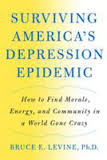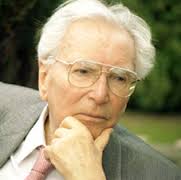Among the lawyers whom I have known, it occurs to me that the only ones I’ve liked have had bouts of depression. So when Dan Lukasik, lawyer and depression sufferer, invited me to write a piece for his lawyerswithdepression.com, I gladly agreed.
In “Surviving America’s Depression Epidemic,” I explain how depression is neither a character defect nor a biochemical defect but a “strategy” for shutting down overwhelming pain. Given the level of pain in the lives of many lawyers, it does not surprise me that of 104 occupations surveyed by John Hopkins researchers, lawyers were the most likely to suffer depression, 3.6 times more likely than average.
Lawyers all too routinely experience the pain of injustice, the pain of the ugly side of human nature and the pain of money. For a sensitive soul, these pains can become insufferable. Some depressed lawyers, in confidence, tell me about another pain: interacting with soulless colleagues who maintain a “life-is-good” grin on their face as they swim through the day unmoved by the misery that surrounds them.
Many historians consider one depressed lawyer, Abraham Lincoln, to be the greatest U.S. president because of his critical thinking, wisdom and compassion. According to Joshua Wolf Shenk’s “Lincoln’s Melancholy: How Depression Fueled a President to Greatness,” the evidence is strong that by today’s standards Lincoln would have been diagnosed with major depression. Support for this thesis rests not simply on the famous Lincoln quote, “I am now the most miserable man living”; and goes beyond the observation of Lincoln by his longtime law partner William Herndon that, “gloom and sadness were his predominant state.”
Shenk reports that Lincoln actually suffered two major breakdowns, which included suicidal statements that frightened friends enough to form a suicide watch. Lincoln’s propensity for gloom was widely known during his lifetime, but in an era when a dark temperament was viewed as neither a character defect nor a biochemical defect, it actually helped Lincoln politically more than it hurt him. Shenk points out that Lincoln’s depression “seemed not a matter of shame but an intriguing aspect of his character, and indeed an aspect of his grand nature.”
In contrast, after depression was medicalized, George McGovern’s 1972 vice presidential running mate Thomas Eagleton was shoved off the ticket because of his history of medical treatment for depression. This calls into question the contention that diseasing depression destigmatizes it. Despite billions of dollars spent attempting to establish biochemical markers for depression, no such markers exist. This is why depression continues to be diagnosed via symptom checklists, not with lab tests, brain scans or any other biochemical means. And recently, psychiatry officialdom discarded the serotonin deficiency explanation of depression.
Is there a better model for both understanding and overcoming depression?
There exists a great deal of research showing that depression is highly associated with overwhelming pain including the pains of loneliness, a miserable marriage, childhood trauma, poverty, unemployment, physical incapacitation and a variety of significant hurts and losses. Instead of viewing depression as either a character defect or a biochemical defect, depression is better seen as a strategy for shutting down overwhelming pain.
Similar to the shutdown strategy of substance abuse, depression can also get out of hand and become a compulsion (a behavior not freely chosen). Compulsive shutdown strategies such as depression not only shut down pain but also can shut down our entire being. Hence the classic symptoms of depression: shutdown of energy; shutdown of the ability to experience pleasure including the shutdown of sex drive; shutdown of cognitive functions such as attention, memory and concentration; and sometimes complete shutdown and immobilization.
In modern industrial societies, immobilization is terrifying because it can lead to poverty, homelessness and institutionalization, so the fear of immobilization is quite rational. This fear is painful, and so we may use depression or other shutdown strategies to suppress it. Thus we have a vicious cycle: pain, a shutdown strategy such as depression resulting in immobilization, a fear of immobilization and more depression to shut down that painful fear.
A major reason why I wrote Surviving America’s Depression Epidemic was to provide a way out of that vicious cycle. One problem for critically thinking lawyers is that critical thinking is associated with depression. Studies show that moderately depressed people are more accurate in their assessments of an often-painful reality than are non-depressed people. There’s more bad news for critical thinkers. Critical thinking can make it more difficult for standard psychiatric treatments to work.
To the extent that one knows the truth about depression treatments—that no treatment, including antidepressants, has been proven to be much more effective than a placebo— it makes it more difficult to have faith in treatment. This lack of faith makes it more difficult for treatment to “work.” In reflecting on the empirical research on depression: my work with depressed people; biographies and memoirs of people who have experienced depression; and my own personal experience with demoralization, immobilization and despair, it is difficult to deny the power of what scientists call “the placebo effect” —which is more commonly called “belief” and “faith.”
If one has faith in the efficacy of a treatment or approach, one’s likelihood of overcoming depression increases. Lincoln, for example, came to have faith in humor and meaningfulness, which were two powerful antidepressants for him. Many Lincoln biographers note that Lincoln told jokes and funny stories as a political tool to both disarm and connect, but Lincoln also used humor as an antidote for depression. Lincoln said, “If it were not for these stories—jokes –jests, I should die; they give vent—are the vents of my moods and gloom.”
Lincoln also discovered the antidepressant power of meaningfulness. Though Lincoln shared with other politicians the trait of ambition, he also wanted his life to have genuine meaning, which he found first in attempting to stop the spread of slavery and then, when the political climate changed, in his Emancipation Proclamation. Can meaningfulness provide lifesaving morale?
In “Man’s Search for Meaning,” Viktor Frankl describes a harrowing tale of his physical, psychological and spiritual survival in Nazi concentration camps. Frankl states that in the concentration camps, “The thought of suicide was entertained by nearly everyone.” Frankl discusses the therapy he provided for two men who seriously talked about suicide: “In both cases it was a question of getting them to realize that life was still expecting something from them.”
For one man, it was a child waiting in a foreign country, and for the other, a scientist, lifesaving meaning was a series of books that no one but he could complete. I wrote “Surviving America’s Depression Epidemic” for critical thinkers who are pained by the injustices and dehumanization of modern society, some of whom become depressed and are failed by standard psychiatric treatments.
While critical thinkers are more likely to experience depression and less likely, from my experience, to be helped by standard psychiatric treatments, the good news is that there are—in addition to humor and meaningfulness— other solutions for a depressed critical thinker with a soul.
Editor’s Note: Bruce E. Levine, Ph.D., is a clinical psychologist and has been in private practice in Cincinnati, Ohio since 1985. Dr. Levine’s most recent book is Surviving America’s Depression Epidemic: How to Find Morale, Energy, and Community in a World Gone Crazy. Dr. Levine lectures, provides workshops and is a regular contributor to numerous magazines. www.brucelevine.net.











